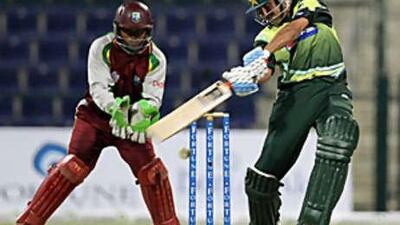ABU DHABI // Lose, you are quickly discarded, but win and you are the darling of all. But the Pakistan captain Shoaib Malik was not ready to expand on the contribution that gave his team a thrilling win over the West Indies in the first of the three-match series at the Zayed Cricket Stadium.
When Kamran Akmal walked in after Malik's departure, Pakistan needed 33 runs from 17 balls. "We were behind the required run rate but I knew we had a chance with wickets in hand," he said. "I was confident Akmal would do something extraordinary." Akmal did not disappoint his captain but, for one who has opened the innings and scored five Test and four ODI centuries, coming in at No 8 after the rookie Fawad Alam, raised a few eyebrows.
The captain justified by saying: It was to have a left hand and right hand combination going." The captain clearly had his thinking cap was on while he was out in the middle. Malik led from the front with a flamboyant 66 off 50 deliveries. He had earlier chipped in with a tidy 10-over bowling spell, when the West Indies were going at over six runs per over. He was quick to attribute the win to team work and focus on the task ahead when the two teams meet again today.
"We are going into a new game and we have to do it all over again," he said. "No doubt, we can use the first game as a catalyst to move forward." The team management did not seem keen on changing a winning combination ,and that could rule out the fast bowler Shoaib Akhtar for the second game even if he regains full fitness. The fast bowler was ruled out of the opening game after he suffered a calf injury in training.
He bowled only seven overs across two spells in the practice session and the bowling coach Aaqib Javed said only Akhtar himself knows if he is ready for tonight. The coach Intikhab Alam also stressed: "Shoaib will play only if he's 100 per cent fit." The West Indies camp would have been disappointed as they were on top of the game until that dramatic last over. Chris Gayle, the captain, was upbeat of his team's chances.
"We had 294 on the board, so no complaints on that," he said. "It was a good game and a result from which we can take a lot of positives to the next match." apassela@thenational.ae


